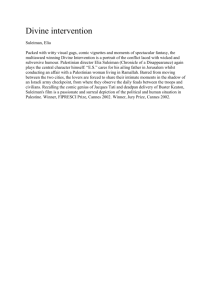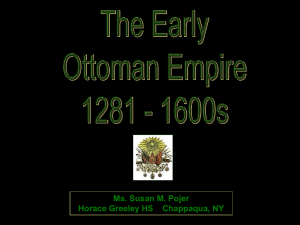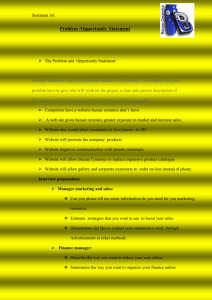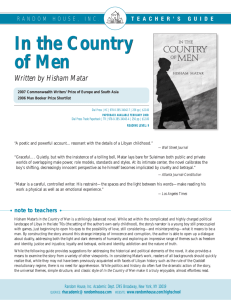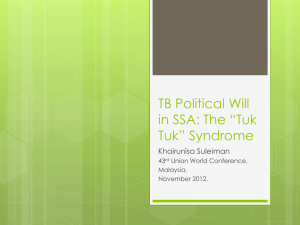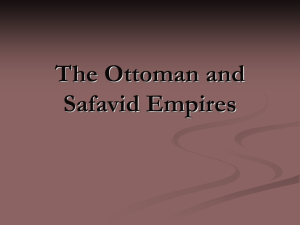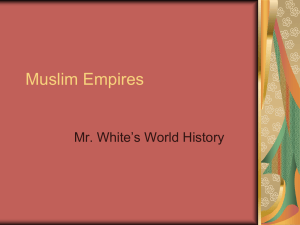Preview - Insight Publications
advertisement
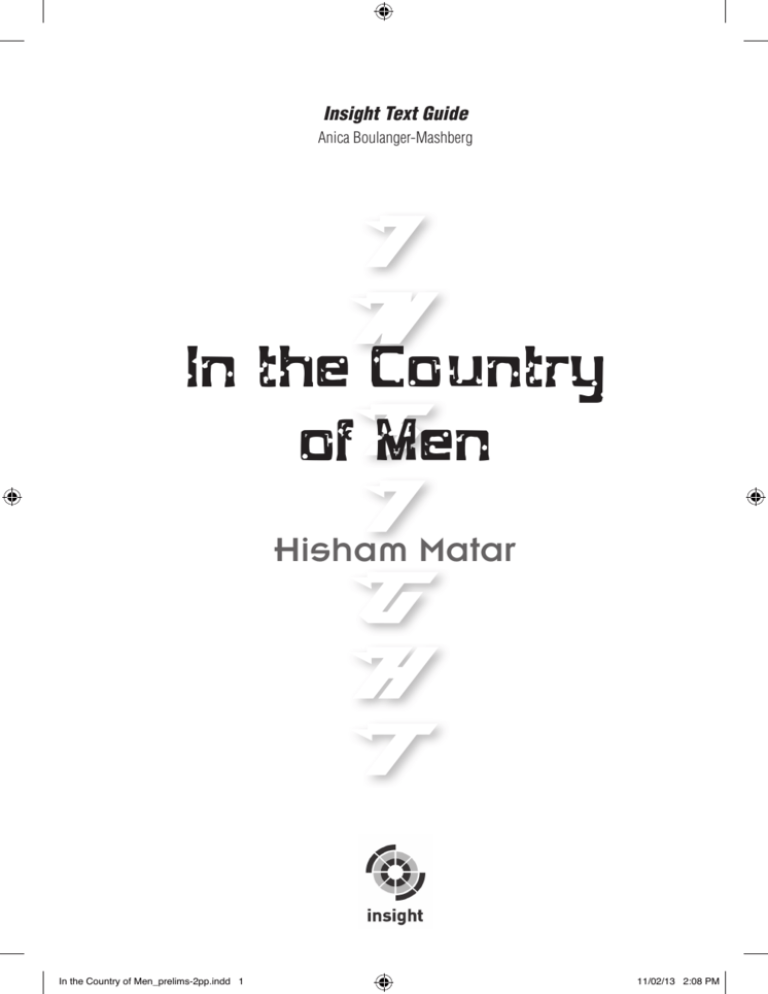
Insight Text Guide Anica Boulanger-Mashberg In the Country of Men Hisham Matar In the Country of Men_prelims-2pp.indd 1 11/02/13 2:08 PM contents Character map Overview iv 1 About the author 1 Synopsis 2 Character summaries 3 Background & context 6 Genre, structure & language 9 Chapter-by-chapter analysis 15 Characters & relationships 36 Themes, ideas & values 46 Different interpretations 60 Questions & answers 63 Sample answer 70 References & reading 73 Glossary 75 In the Country of Men_prelims-2pp.indd 3 11/02/13 2:08 PM iv In s i g h t T e x t G u i d e character map Najwa Suleiman’s mother; married at fourteen and pregnant at fifteen; loyal to her husband but resents the resistance movement. married Faraj Suleiman’s father; works as an importer; supports the resistance movement; is taken by the Revolutionary Committee. friends friends mother/son uneasy friends father/son Moosa Egyptian; a friend and brother-figure to Baba; supports the resistance; takes care of Najwa and Suleiman when Baba is away. father/ son style relationship Rashid University lecturer; represents the resistance; publicly executed; father of Kareem, wife of Salma, neighbour and friend to Faraj and family. Suleiman Narrator and central character, an only child; cares for his mother when his father is away on business; solitary and occasionally violent. father/son friends occasional contact Sharief Member of the Revolutionary Committee; conducts surveillance in Mulberry Street after taking Rashid; oddly kind to Suleiman. In the Country of Men_prelims-2pp.indd 4 Kareem Only child; Suleiman’s neighbour; withdraws after his father is taken; eventually tries to rekindle friendship with Suleiman. 11/02/13 2:08 PM 1 In t h e C o u n t r y o f M e n OVERVIEW About the author Hisham Matar was born in 1970 in New York City. His parents moved back to their home country of Libya soon after and lived in Tripoli until he was nine. His father, Jaballa, was considered a dissenter, opposed to the revolutionary politics and totalitarian rule of Muammar el-Qaddafi (better known in the West as Colonel Gaddafi). In order to protect his family, Jaballa Matar escaped with them to Cairo. Unfortunately Egypt could not continue to provide the safe haven for which he had hoped; in 1990 he was kidnapped. Matar later discovered that his father had been taken back to Tripoli and kept in Abu Salim prison where detainees were subjected to incessant prorevolutionary propaganda. Matar and his family received very occasional covert communications from his father or others who had contact with him, but after more than two decades they still had not seen him or received confirmation that he was alive (Matar 2010). It is perhaps not surprising, then, that In the Country of Men (2006) describes a situation very similar to Matar’s own: a young Libyan boy’s father is captured and detained for his political views and activism. In the novel, though, the father returns (albeit damaged) to his family. Matar’s second novel, Anatomy of a Disappearance (2011) also explores a father– son relationship and themes of loss, absence and political tyranny. Matar himself has said that ‘awards are inadequate for assessing good literature. They are very subjective ... But they remain a very effective way of highlighting new talent’ (Musiitwa 2011). In the Country of Men was Matar’s first novel, and its numerous awards gained him significant attention as a new talent. These awards include the inaugural Arab American Book Award and the Commonwealth Writers’ Prize Best First Book Award (Europe and South Asia). The novel was shortlisted for a number of other prestigious awards including the Man Booker Prize In the Country of Men_text-4pp.indd 1 12/02/13 3:04 PM 2 and the Guardian First Book Award, and was included in the New York Times ‘100 Notable Books of 2007’ list. It has been translated into many languages. Synopsis In the Country of Men portrays socially and politically turbulent Libya during the late 1970s through the eyes of nine-year-old Suleiman. The novel follows Suleiman throughout the last summer of his life in Libya, before he is sent by his parents to live in Cairo in the hope that he might escape some of the violence and danger they have faced in their lives. The novel tells a personal and domestic story of familial loyalty, love, conflict and claustrophobia. This narrative of Suleiman’s relationship with his parents is set against the broader political context of a country in the process of resisting the dictatorial reign of what was allegedly a democratic government. Suleiman, an only child, is left alone with his mother whenever his father goes away on business. When she despairs and turns to drink, as she regularly does when her husband is away, Suleiman is responsible for her emotional and physical welfare and has an ambivalent relationship with this responsibility: he resents having to care for his mother when she is ‘ill’ yet harbours fantasies of rescuing her (even extending this desire to the past, when she was young, where he imagines he could have prevented her future suffering). During the summer of 1979, Suleiman’s own challenges are put into a new perspective when first a friend and neighbour, and then his father, Baba, are detained by the Revolutionary Committee. The neighbour, Rashid, is executed as a traitor and although Baba is allowed to live, he is physically and psychologically scarred; he and his wife finally decide to send Suleiman to Cairo where he remains until the end of the novel, not even returning to Libya when Baba dies. The novel is told principally from Suleiman’s perspective as a child, with occasional shifts in the narrative perspective reminding us that it is an adult Suleiman who is narrating the story. Much of the novel is concerned In the Country of Men_text-4pp.indd 2 12/02/13 3:04 PM 3 In t h e C o u n t r y o f M e n with Suleiman’s home life; intrusions from the rest of the world most often occur in the form of phone calls, visitors, televised interrogations or radio reports. Until Suleiman moves to Cairo, the majority of the scenes are set within the family house or garden, with only isolated excursions to the beach, town or schoolyard. Suleiman’s interactions with characters other than his mother and father are limited, and his own thoughts and observations of the world are central to the novel. Character summaries Suleiman Nine-year-old Suleiman is the central character. He tells the story from later in his life – in the final chapter he is twenty-four. An only child, he has close but ambivalent relationships with both of his parents, and looks up to other adults including Moosa and Ustath Rashid. (Also known as Slooma, Suleiman Faraj el-Dewani.) Najwa (Mama) Suleiman’s mother, Najwa, was married to Faraj at fourteen and had Suleiman at fifteen. Her brothers and father arranged the marriage and she still resents it, although she cares for Faraj and is loyal to him. Her affection grows when he comes home after being tortured. She often turns to alcohol when Faraj is away on business, requiring Suleiman to care for her. (Also referred to as Mama, Naoma, Um Suleiman.) Faraj (Baba) Suleiman’s father is an importer who often travels for work. He is older than his wife. He is considered a traitor by Qaddafi’s regime because of his association with the underground resistance group plotting against it. (Also referred to as Baba, Faraj el-Dewani, Faraj Bu Suleiman el-Dewani, Bu Suleiman.) Moosa An old friend of Baba’s, Moosa is a second father-figure for Suleiman, often visiting Suleiman and Najwa when Baba is away. It is Moosa In the Country of Men_text-4pp.indd 3 12/02/13 3:04 PM 4 who brings home the wounded Baba when he is finally released by the Revolutionary Committee. Moosa is the son of Judge Yaseen. Although originally from Egypt, Moosa considers himself Libyan and is loyal to the resistance movement. When he and his father are deported back to Egypt, they provide a home for Suleiman with them. (Moosa: Arabic version of the biblical Moses.) Kareem The son of Rashid and Salma, Kareem is Suleiman’s next-door neighbour and best friend. Kareem is three years older than Suleiman, and he too is an only child. Suleiman thinks of him as a blood brother until Rashid’s disappearance, when Suleiman becomes uneasy with his company. Many years later Kareem contacts Suleiman and makes an effort to re-open communication between them but Suleiman is unable to rekindle the friendship. Kareem eventually becomes engaged to Siham. Ustath Rashid Rashid, Kareem’s father and Salma’s husband, is professor of Art History at the el-Fateh University. Though he is absent for most of the novel, his story is central to it: he is seized by the Revolutionary Committee as a traitor, is interrogated and later is publicly executed. Rashid is a good friend of Baba’s. Salma Rashid’s wife and Kareem’s mother, Salma is a close friend of Najwa until Rashid is taken, after which Najwa becomes frightened and cautious, avoiding contact with her neighbour. Salma has a brother in Benghazi (east of Tripoli) to whom she and Kareem travel after Rashid’s death. (Also referred to as Auntie Salma.) Nasser Faraj’s office clerk, Nasser is associated with the resistance movement. Faraj sees him as a younger brother and Suleiman reluctantly looks up to him. In the Country of Men_text-4pp.indd 4 12/02/13 3:04 PM 5 In t h e C o u n t r y o f M e n Bahloul Bahloul, the local beggar, is known to the community. Being mentally disturbed, he often rants, but sometimes the things he says appear to make sense and he is portrayed almost as a prophetic figure. Suleiman is physically cruel to him on several occasions, and attempts to drown him. Sharief Sharief is a member of the Revolutionary Committee who becomes familiar to Suleiman as the novel progresses. He is one of the men who take Rashid away; he is with the group who search the house for Baba; and he conducts regular surveillance in Suleiman’s street. He tries to convince Suleiman that he is a friend of Baba’s, in the hope of obtaining information. Ustath Jafer and Um Masoud Jafer is a member of the Mokhabarat: Qaddafi’s intelligence agency. He and his wife, Um Masoud, are a threatening presence in Suleiman’s street where several families don’t support Qaddafi. When Mama eventually goes to them for help, they are instrumental in organising Baba’s release. Ustath Jafer is ‘rough and unrestrained’ in his dealings with his wife (p.161). Their children, Masoud and Ali, are friends with Kareem, Suleiman and the other boys in the street. (Ustath Jafer is also called Bu Masoud.) Minor characters Adnan, a neighbourhood child. He suffers from an illness (an unnamed form of haemophilia) that affords him a certain importance among the other children. Suleiman accidentally injures him, alienating himself from the group. Judge Yaseen, Moosa’s father and eventually Suleiman’s guardian; an important judge appointed by the overthrown King Idris. Khaled, a poet and Najwa’s brother; primarily responsible for his sister’s arranged marriage after denouncing her to their family for socialising in public with a boy. (Also known as Uncle Khaled.) Majdi, the baker and Najwa’s supplier of illegal (and religiously prohibited) grappa (alcohol). In the Country of Men_text-4pp.indd 5 12/02/13 3:04 PM 6 Masoud, Ali, Osama, other neighbourhood children. Muammar el-Qaddafi, often called ‘the Guide’: the leader of the country after staging a coup in 1969 (the ‘September Revolution’) to overthrow King Idris. Qaddafi is not personally involved in the narrative but is a constant presence and an influence on the characters’ lives. Sheik Mustafa, Suleiman’s Quran teacher, imam of the local mosque, blind. Siham, Nasser’s younger sister and eventually Kareem’s fiancée (although Suleiman had loved her the first and only time they met). BACKGROUND & CONTEXT Libya Libya, a country on the central north coast of Africa, is bordered by the Mediterranean Sea and six African countries, including Egypt to the east. Arabic is the country’s official language and Tripoli, where Suleiman’s family lives, is its capital and largest city. The country’s political history is complex; this guide provides only a basic overview of the historical and political background as it relates to the novel. For more detailed histories, refer to specific sources including those listed at the end of this guide. In Chapter 3, Suleiman goes with Rashid’s university students to Lepcis, where the remains of Libya’s early history can be seen. The students and Suleiman are all familiar with this history, and when they visit the ruins they refer to the early Greek, Lebanese and Roman occupations and settlements. Matar doesn’t expect us to gain a detailed historical understanding of the country; what is important is the students’ familiarity with and connection to their history. In the Country of Men_text-4pp.indd 6 12/02/13 3:04 PM
